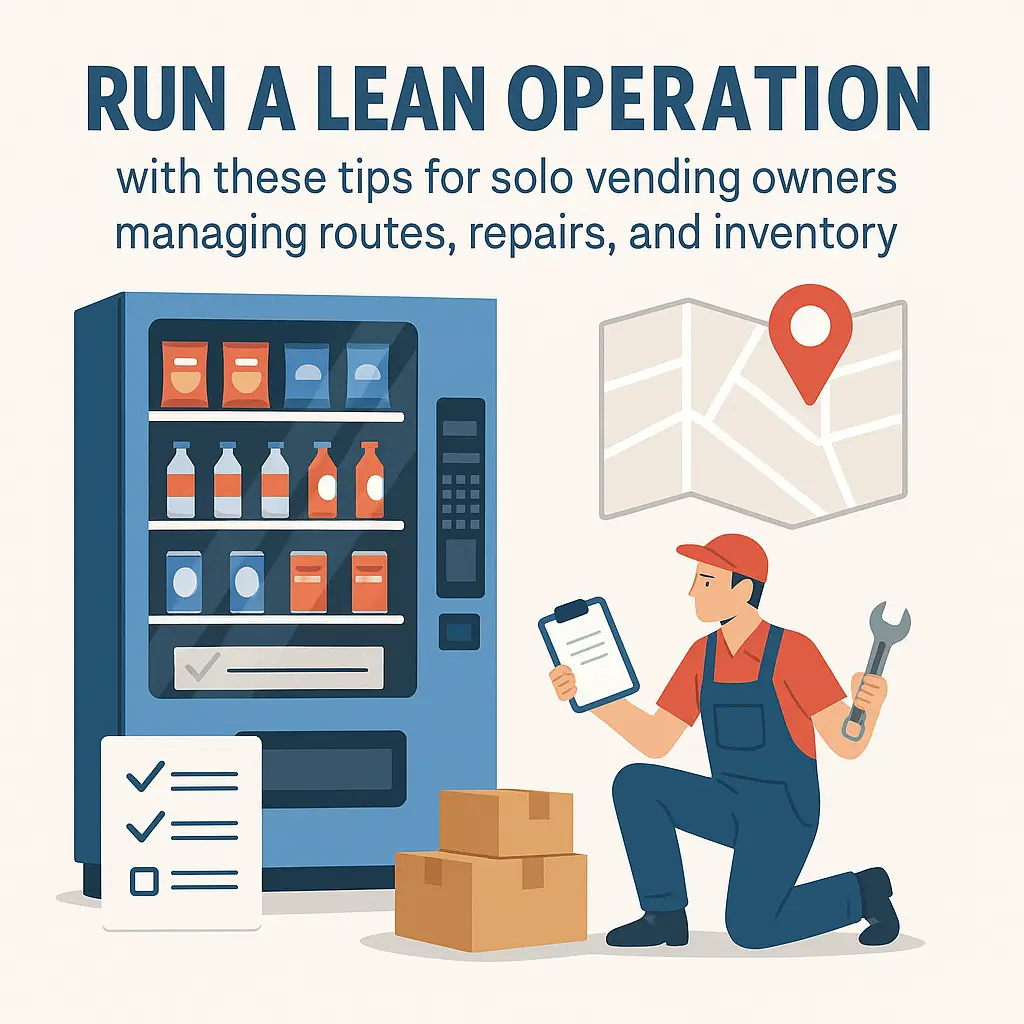Tips for Solo Vending Operators
Run a lean operation with these tips for solo vending business owners managing routes, repairs, and inventory.
Back to Vending Business Startup ResourcesRun a lean operation with these tips for solo vending business owners managing routes, repairs, and inventory.
Back to Vending Business Startup ResourcesStart your 30-day free trial and get instant SMS and email alerts whenever a local business needs vending service. These are real location leads to help you grow your route — you decide which ones to buy, no obligations or contracts.
![]() Use route planning apps to boost service efficiency
Use route planning apps to boost service efficiency
![]() Smart inventory systems reduce restock trips and shortages
Smart inventory systems reduce restock trips and shortages
![]() Routine maintenance prevents costly machine downtime
Routine maintenance prevents costly machine downtime
30 days free, then $39 / month.
No Commitment. Cancel Anytime.

Running a vending machine business solo can be both rewarding and overwhelming. As a sole operator, your time and energy are valuable assets, so efficiency at every level determines your long-term success. Route planning is one of the most crucial areas. Using mapping software or mobile apps like Circuit or RoadWarrior can help streamline your daily visits and minimize fuel costs. Target high-traffic machines first and stick to a consistent service schedule.
To reduce the frequency of restock trips, invest in inventory tracking tools—even a basic spreadsheet can help. More advanced operators often rely on telemetry-equipped machines for real-time inventory alerts. This technology can improve product variety and cut down on spoilage or stockouts. Consider categorizing your products (snacks, beverages, healthy options) and adjust based on sales data to improve profitability per stop.
Equipment upkeep is another critical task. Schedule weekly machine checks to avoid larger breakdowns later. Carry a basic tool kit, keep extra motors and coin mechanisms handy, and learn to perform simple repairs yourself to reduce downtime and repair costs. For more advanced tech like AI-enabled vending machines, become familiar with diagnostic software and remote management tools.
Since you're also managing the business side, keep your finances organized from day one. Track all expenses—gas, product costs, repairs, and mileage. This simplifies year-end accounting and helps you take advantage of deductions. Check out our guide on vending business deductions and tax strategies to stay compliant and improve profitability.
Finally, don’t hesitate to outsource when needed. Hiring part-time help periodically or using local maintenance professionals can free up your schedule during peak periods. Lean operations require smart delegation, not just hustle. Build regular systems for restocking, repairs, and accounting to run as efficiently as possible without burning out.
Vending Exchange connects vending operators with real businesses actively looking for vending services—including traditional machines, AI coolers, and office coffee. Get instant SMS and email alerts when new opportunities are available in your area. No contracts or monthly fees—just buy the leads you want. Start your free 30-day trial today and grow your vending business on your terms.
Use route planning apps like Circuit or RoadWarrior to organize stops and reduce drive time.
Telemetry systems and spreadsheets let you monitor stock levels and cut unneeded visits.
Perform preventative maintenance weekly and learn basic repairs to handle issues quickly.
Use accounting software or spreadsheets to capture daily sales, mileage, and repair costs.
Yes—track mileage and fuel for route servicing to claim deductions on your vending taxes.
It depends on the location's traffic, but most solo operators restock every 5–7 days.
Focus on shelf-stable snacks and drinks with long expiration dates to minimize product loss.
AI machines offer remote inventory monitoring, reducing service trips—but come with higher upfront costs.
Provide a contact number on machines and respond promptly; solving issues fast builds trust.
During heavy growth or repairs beyond your expertise, outsourcing can save time and money.